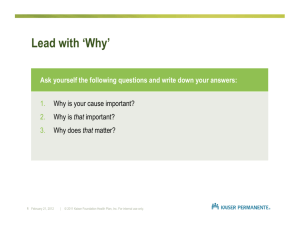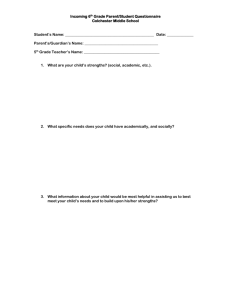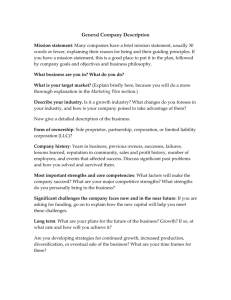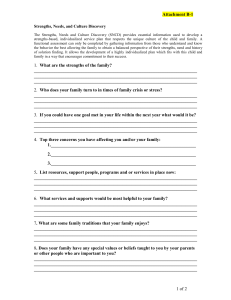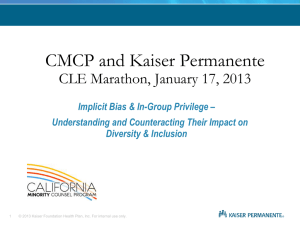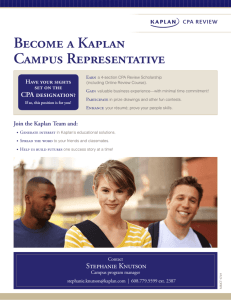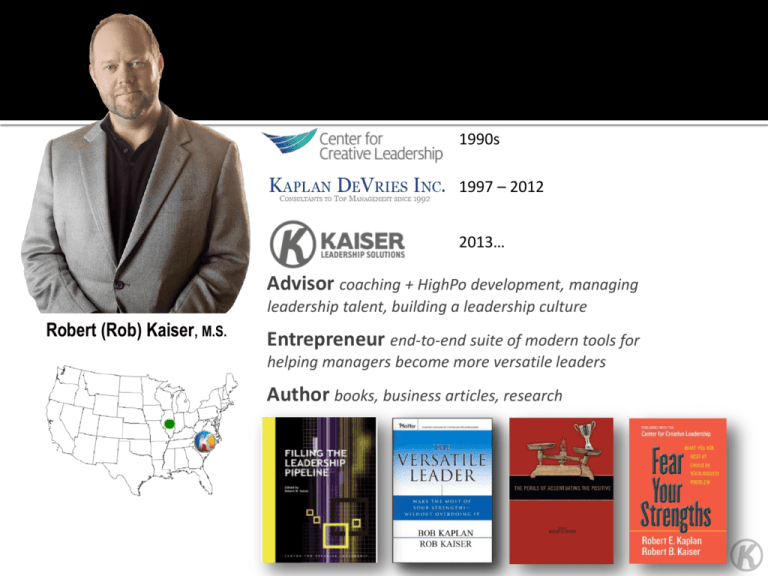
1990s
1997 – 2012
2013…
Advisor coaching + HighPo development, managing
leadership talent, building a leadership culture
Robert (Rob) Kaiser, M.S.
Entrepreneur end-to-end suite of modern tools for
helping managers become more versatile leaders
Author books, business articles, research
a practical guide to versatility
2 hours
Two open secrets
We all know, but don’t really know
Insight for development
For you & your people
Interactive
Large & small groups, private reflection
What one thing,
more than anything else,
do great leaders do?
Strengths Overused
Strengths
can become
weaknesses
McCall & Lombardo (1983) Off the Track: How and Why Successful Executives Get Derailed. CCL.
McCall (1998) High Flyers.
His greatest strengths – the
uncompromising determination,
sharp-tongued irreverence, and
unblushing idealism – turned
out to be critical flaws.
[His] high-minded resolve began
to look to others like simpleminded obstinacy...
Unshakeable. Self-reliant.
Comfortable in the spotlight.
Fond of the dramatic gesture.
Passionate about the big picture.
Impervious to criticism. The kind
of person who bounds from
project to project, embracing
change as a way of life.
Those traits helped Carly Fiorina
win the top job at Hewlett
Packard… Now, with her sudden
ouster from H-P, they are sure to
be seen as flaws as well.
Without his vision and
personality – confidence,
showmanship, and charm –
Vivendi would never have come
into existence.
Without his weaknesses –
delusions of grandeur,
megalomania, and breathtaking
financial recklessness – the
dream of a French champion
might have survived.
Jean-Marie Messier,
Moi-Même, Maître du Monde
(Me, myself, master of the world)
Strengths Overused
Determination
Stubbornness
Self-reliant
Uncooperative
Confidence
Arrogance
Identify someone on your staff
who overplays a strength
•
•
•
•
•
Describe the strength (in terms of behavior)
How does the person “overdo it”?
What impact does it have on others, the organization?
When is the strength useful?
When is it counterproductive?
Why do managers overplay
their strengths?
•
•
•
•
Natural to rely on what comes easy
Reinforced by prior success
Don’t know how much is “enough”
Worried they aren’t strong enough
"Look, I'd like to avoid overkill,
but not at the risk of underkill."
by Robert Mankoff
© The New Yorker 3 Dec, 2001
Why do managers go too far
with their strengths?
•
•
•
•
•
Natural to rely on what comes easy
Reinforced by prior success
Don’t know how much is “enough”
Worried they aren’t strong enough
Don’t know their own strength
Underdo
Overdo
Avoid failing,
looking foolish
Go all out to
prove yourself
Underestimate
Kaplan (2002) Know your strength. Harvard Business Review
Feedback and coaching on
strengths overused
• Start with positives
• Note that it can be taken too far
• Describe in specific, behavioral terms
• Maintain objectivity
• S-B-I (situation, behavior, impact)
• Guide person to self-awareness
• What drives you to go too far?
• What might happen if you eased up?
• What situations trigger the behavior?
Research on
Strengths Overused
Kaiser & Kaplan (2005) Overlooking overkill. Human Resources Planning
Kaiser & Kaplan (2005) On the folly of linear scales. Performance appraisal: A critical view
Item text
“Pays attention to detail—
has a finger on the pulse
of day-to-day activities.”
Average subordinate ratings for 107 executives
Kaplan & Kaiser (2003) Rethinking a classic distinction. Consulting Psychology Journal
Overkill is Everywhere
6
median number of
behaviors (out of 48)
rated as “too much”
N = 421 senior managers
Kaiser & Kaplan (2009) When strengths run amok. Perils of Accentuating the Positive
% rated
“too much”
by coworkers
Doesn’t back down
64%
Short-term focus
Stays with the tried and true
Goes by the book
Assumes authority
Steps in when trouble arises
Decisive
In control
Pays attention to detail
50%
49%
47%
46%
45%
44%
43%
40%
N = 421 senior managers
Kaiser & Kaplan (2009) When strengths run amok. Perils of Accentuating the Positive
The Cost of Overkill
Too little
The right
amount
Too much
Kaplan & Kaiser (2009) Stop overdoing your strengths. Harvard Business Review
Blindspots
58%
Proportion of
behaviors rated
“too much” by
coworkers but
not by managers
themselves
N = 421 senior managers
Kaiser & Kaplan (2009) When strengths run amok. Perils of Accentuating the Positive
What do you overdo?
•
•
•
•
•
Things that come naturally
Things that brought you success in past
Things you trust to produce outcomes
Things you admire, highly value
Things you worry about not being good
enough at
Shortcoming
used too little,
a “weakness”
STRENGTH
what you do
really well
STRENGTH
OVERUSED
taken to the extreme,
counterproductive
Shortcoming
Too mild and softspoken; lacks
conviction and
confidence
STRENGTH
STRENGTH
OVERUSED
Assertive in making Talks too aggressively;
a point--speaks up
intimidating; talks
and is heard
over people and
interrupts
Why do you overdo it?
•
•
•
•
Part of your personality
Associated with past success
Stress leads us to fall back on what we know
What about mindset and motivation?
• Is it hard to imagine “too much of a good thing?”
• Do you know your own strength?
• Imagine not doing the behavior:
what do you worry might happen?
What is the
opposite of that thing?
What is the complementary
opposite of that thing?
Lopsided Leadership
Kaplan & Kaiser (2009) Stop overdoing your strengths. Harvard Business Review
Task-oriented
Autocratic
Initiative
Transactional
Short-term
Stability
Efficiency
People-oriented
Participative
Consideration
Transformational
Long-term
Change
Innovation
Kaiser & Overfield (2010) Assessing flexible leadership as a mastery of opposites. CPJ
What is the complement to
the “strength overplayed” that
the person does “too little”?
Research on
Lopsided Leadership
Copyright © 2012-2014. Kaiser Leadership Solutions. All rights reserved.
Of those who do
“too much”
FORCEFUL
97% do “too little”
ENABLING
ENABLING
86% do “too little”
FORCEFUL
STRATEGIC
67% do “too little”
OPERATIONAL
OPERATIONAL
94% do “too little
STRATEGIC
N = 421 senior managers rated on the LVI
Kaiser & Kaplan (2009) When strengths run amok. Perils of Accentuating the Positive
Versatility
the ability to read and respond to changing conditions
with a full range of motion; able to freely use opposing
approaches, unlimited by bias in favor of one and
prejudice against the other.
Kaplan & Kaiser (2003) Developing versatile leadership. MIT Sloan Management Review
600
1%
5%
24%
61%
9%
500
400
300
M = 83%
SD = 7%
200
100
50%
60%
70%
80%
Overall Versatility
N = 11,624 senior managers
LVI global norms (2010-2014)
90%
100%
Employee commitment, job satisfaction,
engagement, & turnover
Team morale, engagement, cohesion,
& confidence (in executing strategy)
Variety of business process methods
Team and business unit productivity
Overall leadership effectiveness
see summaries in:
Kaplan & Kaiser (2006) The Versatile Leader (Pfeifer/Wiley)
Kaiser & Overfield (2014) LVI v5.0 Facilitator’s Guide
Overall Effectiveness
10
5.38
6.47
7.37
7.89
8.62
r = .71
9
8
7
6
5
60%
70%
80%
Overall Versatility
N = 11,624 senior managers
LVI global norms (2010-2014)
90%
100%
Overall Effectiveness
10
5.38
6.47
7.37
7.89
8.62
r = .71
9
8
2
r = .71; r = 50%
7
Versatility accounts for half of what
separates
the most effective leaders from
6
the least effective leaders.
5
60%
70%
80%
Overall Versatility
N = 11,624 senior managers
LVI global norms (2010-2014)
90%
100%
What is the complement to the
“strength you overdo”?
Shortcoming
Too mild and softspoken; lacks
conviction and
confidence
STRENGTH
STRENGTH
OVERUSED
Assertive in making Talks too aggressively;
a point--speaks up
intimidating; talks
and is heard
over people and
interrupts
Open to influence;
Closed to other
perspectives; doesn’t can be persuaded to
change my mind
care what other
people think
Too impressionable
and too easily
influenced by the
opinion of others
Shortcoming
used too little,
a “weakness”
STRENGTH
what you do
really well
STRENGTH
OVERUSED
taken to the extreme,
counterproductive
Shortcoming
used too little,
a “weakness”
COMPLEMENT
the other
good thing
OVERUSED
taken to the extreme,
counterproductive
Consider the complement to the
“strength you overdo”
• Do you tend to underdo it?
• How might it be useful?
• Identify a recent situation where you could have
used this behavior, but did not. How might things
have gone differently?
• What is your attitude about this behavior?
• What’s the worst that could happen If your were
to do it more?
Strength Overplayed
Shortcoming
used too little,
a “weakness”
STRENGTH
what you do
really well
STRENGTH
OVERUSED
taken to the extreme,
counterproductive
Shortcoming
used too little,
a “weakness”
COMPLEMENT
the other
good thing
OVERUSED
taken to the extreme,
counterproductive
Neglected Complement
Strength Overplayed
Shortcoming
used too little,
a “weakness”
STRENGTH
what you do
really well
STRENGTH
OVERUSED
taken to the extreme,
counterproductive
Shortcoming
used too little,
a “weakness”
COMPLEMENT
the other
good thing
OVERUSED
taken to the extreme,
counterproductive
Neglected Complement
Start with accurate assessment
Strengths
Strengths overused
Shortcomings
Start with accurate assessment
Strengths
Strengths overused
Shortcomings
Verify/validate your self-assessment
Observe your behavior:
When do you overdo it?
When do you underdo it?
Ask for real time feedback
Become more selective about using strengths
Develop capacity (and comfort) with “complementary” skills
Kaiser & Overfield (2010) Flexible leadership as a mastery of opposites. Consulting Psych Journal
Outer work
Inner work
behavior change
mindset change
Kaiser & Kaplan (2006) The deeper work of exec development. Academy of Management
a practical guide to versatility
Heroic
Force of personality
Need for control
Fear of weakness
Servant
Power to the people
Need for relationships
Fear of rejection
Visionary
Creative possibilities
Need to make a mark
Fear of missing out
Expert
Technical know-how
Need for mastery
Fear of making a mistake
Kaiser & Kaplan (2006) The deeper work of exec development. Academy of Management
AMB
INS
EXC
CAU
INQ
PRU
IMG
CAU
ADJ
AMB
AMB
INQ
INS
ADJ
DUT
EXC
PRU
SOC
DIL
IMA
Kaiser & Hogan (2011) Personality, leadership, and overdoing it. Consulting Psych Journal
Kaiser, LeBreton, & Hogan (2013) Dark personality and extreme leader behavior. Applied Psych
Strategic
Operational
22%
12%
9%
39% 18%
Forceful
Enabling
N = 11,624 senior managers
LVI global norms (2010-2014)
Self-assurance
Command
Positivity
Relator
Winning others over
“…the cockiest guy I have
ever met in my life.”

